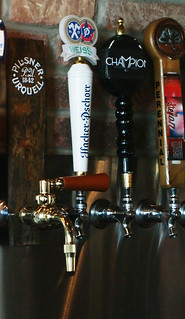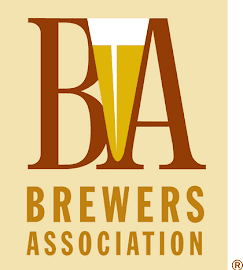 Drinking , Again is a series of occasional reviews of beer (and wine and spirits).
Drinking , Again is a series of occasional reviews of beer (and wine and spirits). No scores; only descriptions.
 World of Beer is a chain of beer-centric taverns with numerous locations, most in the Southeast, but a few elsewhere. Each has 50 taps and sells a large selection of bottled (or canned) beer as well.
World of Beer is a chain of beer-centric taverns with numerous locations, most in the Southeast, but a few elsewhere. Each has 50 taps and sells a large selection of bottled (or canned) beer as well.Recently, World of Beer offered what appeared to be an exclusive.
The chain had procured kegs —unfiltered and unpasterized— of Pilsner Urquell, the iconic pilsner* from the Plzensky Prazdroj brewery in Plzen, Czech Republic, and had had them air-freighted from there to the various World of Beer locations. According to press releases, Pilsner Urquell can rarely be tasted this way (both unfiltered and unpasteruized) except at the brewery itself.
There is a World of Beer located near to me. So, this 'natürlichen' Pilsner Urquell, I would be fortunate enough to try.
First, a bit about Pilsner Urquell.
—The Encyclopedia of Beer (1995)Plzensky Prazdroj, in Plzen, Czech Republic, is the source of Pilsner Urquell ([meaning] the "original Pilsner"). The brewery has operated since 1842, producing a bottom-fermented pale beer that has become the model for Pilsners the world over. Bottom-fermenting yeast ... when combined with Bohemian hops and soft, local water, made for quite a beer.
[...] The company traditionally fermented the beer in open, wooden vessels, and aged it in pitch-lined oak casks. Some beer enthusaists might selfishly feel that the "velvet revolution' that freed the Czech Republic was a mixed blessing, for it has brought technological progress to a brewery that was allowed to pursue its traditonal (albeit labor-intensive methods under communism.
[...] Most of the Pilsner Urquell made for export is [now] fermented and aged in steel vessels.
Arriving at the local World of Beer, I did suffer an initial disappointment. A 'special' (yet simple) lever-valve tap had indeed been installed to serve the beer. But, instead of that, the pub was pouring the beer in the 'normal' manner, through a regular draft beer tap. As it turned out: no matter!
Sipping from this uber-fresh glass of the world's original pilsner, I became enthused enough to tweet about it. And Pilsner Urquell, now very much savy to the modern world, noticed and tweeted back.
@Cizauskas @WOBArlingtonVA Great that you got to have some of the unfiltered and unpasteurised! Flown straight in from Plzen #NaZdravi
— Pilsner Urquell (@Pilsner_Urquell) March 13, 2015Moving to Facebook, I became downright belligerent in my praise.
No pumpkin or peach. No persimmon or peppermint. No civet-extruded coffee beans. No one-billion IBUs. No fermented yak milk aged on a pristine hillside in Tierra del Fuego. No, just the beer, ma'am. Unpasteurized, unfiltered Czech Pilsner Urquell, on draft at World of Beer, in Ballston, Virginia. A touch of fruitiness, and, maybe, a hint of traveled oxidation. OtherwIse delicious. If you're looking for flavored beer, skip this. Save the PU for the rest of us!
Brevity being the soul of social media, I may have omitted a couple/three things.
A thing like that fruitiness: a hint of candied-orange slice that I've never tasted in 'regular' Pilsner Urquell here. Or like that aroma of the Saaz hops, pungent of mowed-grass and flower-garden on a spring day after a light rain (so unlike the dank cat-litter box of some American 2x IPAs). Or like that short-bread maltiness —seemingly subsuming any diacetyl (butteriness), common to the style— the like of which have never before tasted in PU, here.
I was surprised by the relative lack of dimethyl sulfide (DMS), that 'canned corn' aroma I often encounter in packaged lagers, but I did notice an odd 'woodiness' (not oak-barrel 'woodiness'), that I chalked up to 'traveled oxidation,' all 4,300 miles of it. Or not.
Of course, there was the beer's gorgeous, deep golden hue, maybe with even a hint of chartreuse, swimming behind a thin veil of haziness (not murkiness). That was surprising to me, used as I am to the brightness of pilsners, but the beer was, after all, unfiltered. And, finally, as climax and denouement: malt sweetness chased by that long, wonderful, Žatec spicy-hop finish.
Pilsner Urquell, unplugged? Yes, please! True süffigkeit.
I asked my bartender for another.
-----more-----
- * A pilsner (also spelled, "Pilsener") is a golden-hued lager with evident hop character. The (U.S.) Brewers Association identifies two types of pilsners: German-style and Bohemian (Czech)-style. Please note that Miller Lite —despite its claim to be a pilsner— is a (very) light lager. Here is how the Brewers Association defines Bohemian Pilsner:
a slightly sweet and evident malt character and a toasted, biscuit-like, bready malt character. Hop bitterness is perceived as medium with a low to medium-low level of noble-type hop aroma and flavor. This style originated in 1842, with ‘pilsener’ originally indicating an appellation in the Czech Republic. Classic examples of this style used to be conditioned in wooden tanks and had a less sharp hop bitterness despite the similar IBU ranges to German-style pilsener. Low-level diacetyl is acceptable. Bohemian-style pilseners are darker in color and bigger in final gravity that their German counterparts.
- Drinking , Again is a series of occasional reviews of beer (and wine and spirits). No scores; only descriptions.
- Graphic created by Mike Licht at NotionsCapital.














No comments:
Post a Comment
Comment here ...